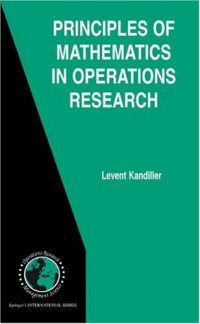
Ebook: Principles of Mathematics in Operations Research
Author: Levent Kandiller (auth.)
- Genre: Mathematics
- Tags: Mathematical Modeling and Industrial Mathematics, Operations Research/Decision Theory, Applications of Mathematics, Computational Mathematics and Numerical Analysis, Optimization, Business/Management Science general
- Series: International Series in Operations Research & Management Science 97
- Year: 2007
- Publisher: Springer US
- City: New York
- Edition: 1
- Language: English
- pdf
Principles of Mathematics in Operations Research is a comprehensive survey of the mathematical concepts and principles of industrial mathematics. Its purpose is to provide students and professionals with an understanding of the fundamental mathematical principles used in Industrial Mathematics/OR in modeling problems and application solutions.
All the concepts presented in each chapter have undergone the learning scrutiny of the author and his students. The conceptual relationships within the chapter material have been developed in the classroom experience working with the students' level of understanding. The illustrative material throughout the book (i.e., worked-out problems and examples of the mathematical principles) was refined for student comprehension as the manuscript developed through its iterations, and the chapter exercises are refined from the previous year's exercises. In sum, the author has carefully developed a pedagogically strong survey textbook of OR and Industrial Mathematics.
Operations Research is the application of scientific models, mathematical and statistical ones, to decision making problems, and PRINCIPLES OF MATHEMATICS IN OPERATIONS RESEARCH is a comprehensive survey of the mathematical concepts and principles of industrial mathematics. Its purpose is to provide students and professionals with an understanding of the fundamental mathematical principles used in Industrial Mathematics/OR in modeling problems and application solutions.
Over the past seven years, all the concepts presented in each chapter have undergone the learning scrutiny of the author and his students. The conceptual relationships within the chapter material have been developed in the classroom experience working with the students' level of understanding. The illustrative material throughout the book (i.e., worked-out problems and examples of the mathematical principles) was refined for student comprehension as the manuscript developed through its iterations. The chapter exercises were formulated each year and refined from the previous year's exercises.
The book uses a very broad spectrum of industrial mathematical applications, which include applications from deterministic (continuous, discrete, static, dynamic) modeling, combinatorics, regression, optimization, and graph theory. Also it's important to note that solutions of equation systems, geometric and conceptual visualization of abstract mathematical concepts have been included. In addition to the end-of-the-chapter exercises, active web resources have been provided at the end of each chapter as well. In sum, the author has carefully developed a pedagogically strong survey textbook of OR and Industrial Mathematics.